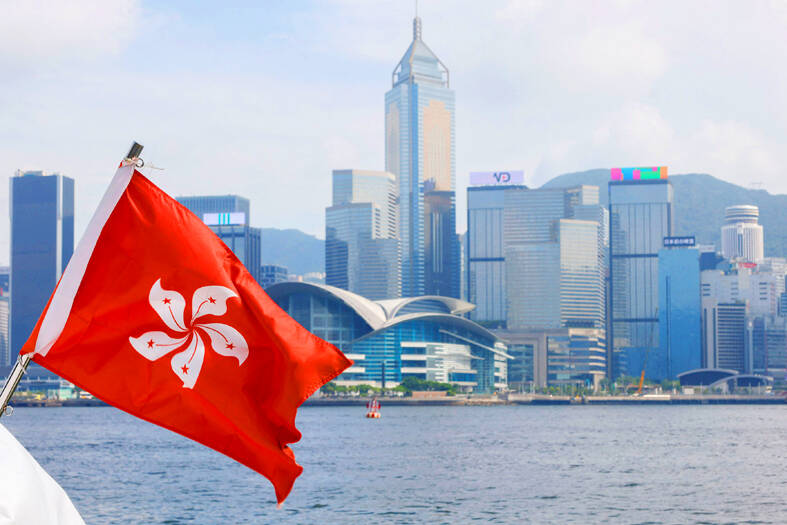Lawmakers and heads of local governments can visit Hong Kong or Macau without seeking approval, making the two regions a loophole in Taiwan’s national security front line against Beijing’s “united front” warfare, a Taiwanese academic said.
Last month, KMT caucus whip Fu Kun-chi (傅崐萁) visited Hong Kong along with his wife, Hualien County Commissioner Hsu Chen-wei (徐榛蔚), to promote Hualien County tourism.
Fu said he was ill and could not attend a cross-party negotiation held at the legislature on Feb. 18.

Photo: REUTERS
His visit to Hong Kong remained unknown until Legislative Speaker Han Kuo-yu (韓國瑜) said that he was absent from the negotiation due to being abroad on leave.
Allowing lawmakers and heads of local governments to visit Hong Kong or Macau unregulated has become a serious security loophole prone to “united front” infiltration, especially as the Chinese Ministry of State Security has intelligence agents in Hong Kong, Taiwan Association of University Professors deputy chairman Chen Li-fu (陳俐甫) said.
The US government has motioned amendments to its US-Hong Kong Policy Act to end special treatment for Hong Kong and stop regarding it as a separate entity from China, he said.
Taiwan’s Hong Kong and Macau policies should be updated as well, but they are floundering in a legislature controlled by the opposition majority, he said.
“Hong Kong is a national security loophole,” he said.
No one knew who Fu had met while visiting Hong Kong, Chen said.
Officials of the Taipei Economic and Cultural Office in Hong Kong have returned to Taiwan, as they refused to sign an affidavit recognizing Beijing’s “one China” principle as a precondition for a visa, leaving the office with only local workers from Hong Kong, Chen said.
Since the government cannot send public servants to the office to accompany visiting Taiwanese officials, meetings with Chinese officials in Hong Kong would go under the radar, he said, adding that laws should be revised to require prior approval for officials’ visits to Hong Kong, Macau and China.
Speaking on condition of anonymity, an official familiar with national security affairs said that Beijing set up an executive agency in Hong Kong in 2021 under Hong Kong’s National Security Law, which had come into force the previous year.
Beijing has since encouraged people in Hong Kong to report cases of suspected national security threats, they said.
From 2021 to last year, there were 750,000 cases reported in Hong Kong, equivalent to about 170,000 cases per year, the official said.
Although Hong Kong has become a stronghold for China’s MSS, Taiwan has yet to launch regulations on heads of local governments visiting Hong Kong or Macau, they said.
Article 9 of the Act Governing Relations Between the People of the Taiwan Area and the Mainland Area (臺灣地區與大陸地區人民關係條例) only stipulates that political appointees, mayors of special municipalities and heads of local governments may not visit China without prior application for approval, the official said.
Those who contravene the provision could be fined NT$10 million (US$304,036), they added.
The Act Governing Relations with Hong Kong and Macau (香港澳門關係條例) does not stipulate any relevant restriction, the official said.
It is highly risky that lawmakers and heads of local governments can visit Hong Kong without applying for approval, they said.
However, given the opposition holds a majority in the legislature, it would be difficult to amend the Act Governing Relations with Hong Kong and Macau, the official said.
Additional reporting by CNA

Taiwan is to have nine extended holidays next year, led by a nine-day Lunar New Year break, the Cabinet announced yesterday. The nine-day Lunar New Year holiday next year matches the length of this year’s holiday, which featured six extended holidays. The increase in extended holidays is due to the Act on the Implementation of Commemorative and Festival Holidays (紀念日及節日實施條例), which was passed early last month with support from the opposition Chinese Nationalist Party (KMT) and Taiwan People’s Party. Under the new act, the day before Lunar New Year’s Eve is also a national holiday, and Labor Day would no longer be limited

Taiwan is to extend its visa-waiver program for Philippine passport holders for another year, starting on Aug. 1, Minister of Foreign Affairs Lin Chia-lung (林佳龍) said on Friday. Lin made the announcement during a reception in Taipei marking the 127th anniversary of Philippine independence and the 50th anniversary of the establishment of the Manila Economic and Cultural Office (MECO) in Taiwan, the Ministry of Foreign Affairs said. The decision reflected Taiwan’s commitment to deepening exchanges with the Philippines, the statement cited Lin as saying, adding that it was a key partner under the New Southbound Policy launched in 2016. Lin also expressed hope

Costa Rica sent a group of intelligence officials to Taiwan for a short-term training program, the first time the Central American country has done so since the countries ended official diplomatic relations in 2007, a Costa Rican media outlet reported last week. Five officials from the Costa Rican Directorate of Intelligence and Security last month spent 23 days in Taipei undergoing a series of training sessions focused on national security, La Nacion reported on Friday, quoting unnamed sources. The Costa Rican government has not confirmed the report. The Chinese embassy in Costa Rica protested the news, saying in a statement issued the same

Temperatures in New Taipei City’s Sindian District (新店) climbed past 37°C yesterday, as the Central Weather Administration (CWA) issued heat alerts for 16 municipalities, warning the public of intense heat expected across Taiwan. The hottest location in Taiwan was in Sindian, where the mercury reached 37.5°C at about 2pm, according to CWA data. Taipei’s Shilin District (士林) recorded a temperature of 37.4°C at noon, Taitung County’s Jinfeng Township (金峰) at 12:50 pm logged a temperature of 37.4°C and Miaoli County’s Toufen Township (頭份) reached 36.7°C at 11:40am, the CWA said. The weather agency yesterday issued a yellow level information notice for Taipei, New